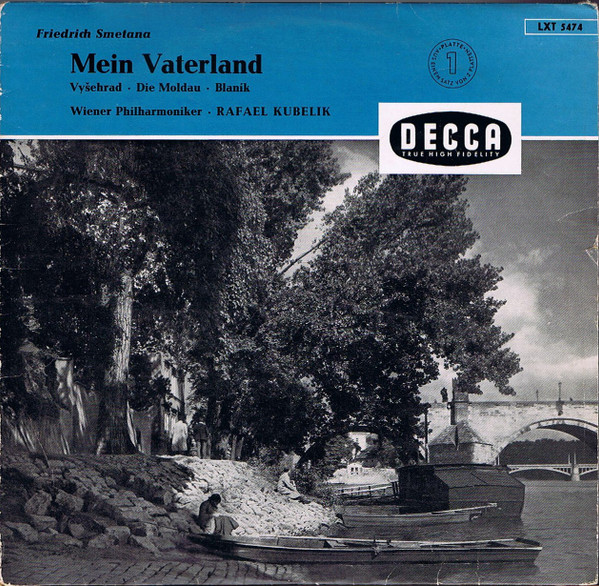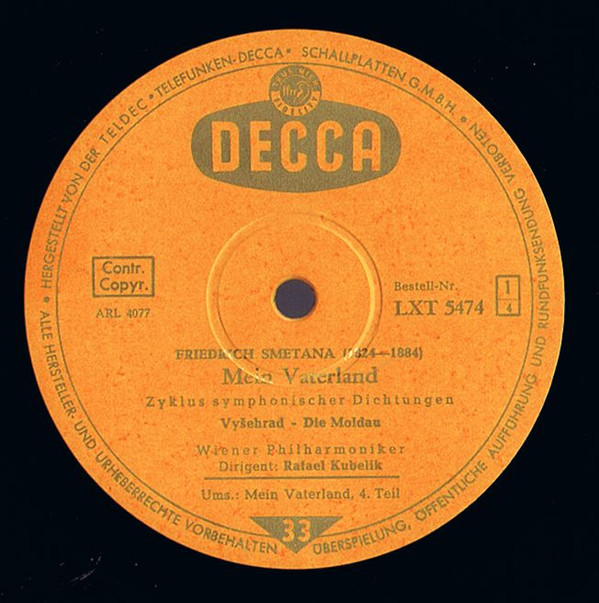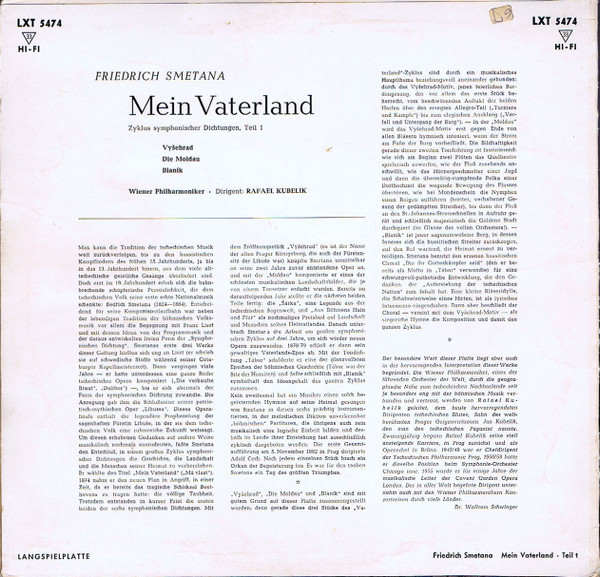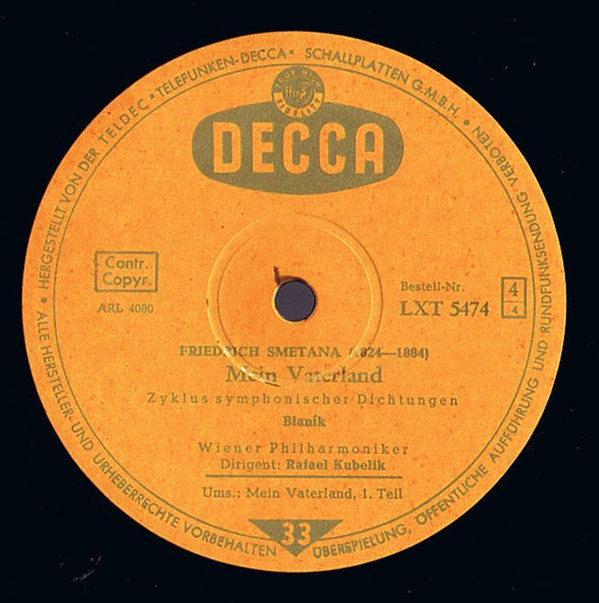Friedrich Smetana, Rafael Kubelik, Wiener Philharmoniker - Mein Vaterland Vyšehrad Die Moldau Blaník
Album: Mein Vaterland Vyšehrad Die Moldau Blaník
Download
Filename: friedrich-smetana-rafael-kubelik-wiener-philharmoniker-mein.zip- MP3 size: 26.8 mb
- FLAC size: 208.4 mb
Table of Contents
Tracks
| Track | Duration | Preview |
|---|---|---|
| Vltava (Moldau) | ||
| Mein Vaterland - Zyklus Symphonischer Dichtungen, Teil 1 | ||
| Blaník | ||
| Vyšehrad |
Video
Bedrich Smetana: Má Vlast conducted by Kubelík. 3: Šárka
Bedrich Smetana: Má Vlast conducted by Kubelík. 1: Vyšehrad (part 1)
Bedrich Smetana: Má Vlast conducted by Kubelík. 2: Vltava (part 1)
Images




Catalog Numbers
LXT 5474Labels
DeccaListen online
- écouter en ligne
- ascolta in linea
- kuunnella verkossa
- escuchar en línea
- online anhören
- online luisteren
- lyssna på nätet
- ouvir online
- lytte på nettet
Formats
- Vinyl
- LP
- Mono
Companies
| Role | Company |
|---|---|
| Manufactured By | TELDEC »Telefunken-Decca« Schallplatten GmbH |
| Pressed By | Teldec-Press GmbH |
| Lacquer Cut At | TELDEC-Studio, Hamburg |
Credits
| Role | Credit |
|---|---|
| Composed By | Friedrich Smetana |
| Conductor | Rafael Kubelik |
| Liner Notes | Dr. Wolfram Schwinger |
| Mastered By | S-II |
| Orchestra | Wiener Philharmoniker |
Notes
Record 1 of a 2 record set, but both records were available separately. This means you could buy only record 1 or record 2, hence listed as two separate entries in Discogs. Both came in their own sleeve.Barcodes
- Matrix / Runout (Label side A): ARL 4077
- Matrix / Runout (Label side D): ARL 4080
- Matrix / Runout (Runout side A): ARL-4077-II-XR
- Matrix / Runout (Runout side B): ARL-4080-I-X S-II Manufactured in Germany
- Rights Society: Contr. Copyr.
About Friedrich Smetana, Rafael Kubelik, Wiener Philharmoniker
Bedřich Smetana (pronounced ; 2 March 1824 - 12 May 1884) was a Czech composer. He is best known for his symphonic poem Vltava (better known as The Moldau), the second in a cycle of six which he entitled Má vlast (My Country), and for his opera Prodaná nevěsta (The Bartered Bride).
Smetana was the son of a brewer in Litomyšl in Bohemia, then part of the Austrian Empire. He studied piano and violin from an early age, and played in an amateur string quartet with other members of his family. Smetana attended a high school in Pilsen from 1840-1843. He studied music in Prague, despite initial resistance from his father. He secured a post as music master to a noble family, and in 1848 received funds from Franz Liszt to establish his own music school.
September 1855 marked the death of his second child, his beloved four-year-old daughter Bedřiška. When his third child died nine months later, he committed himself to composition, producing the Piano Trio in G minor. This piece is full of sadness and despair, making use of phrases that are cut short, possibly in resemblance to his daughter's own life.
In 1856, Smetana moved to Gothenburg, Sweden, where he taught, conducted and gave chamber music recitals. In 1863, back in Prague, he opened a new school of music dedicated to promoting specifically Czech music. By 1874 he had become deaf from syphilis, but he continued to compose; Má vlast was written after his deafness had developed. Smetana also suffered from tinnitus, which caused him to hear a continuous, maddening high note which he described as the "shrill whistle of a first inversion chord of A-flat in the highest register of the piccolo".
From 1875 he lived in small village of Jabkenice.
His string quartet in E minor, Z mého života (From My Life, composed in 1876), the first of only two quartets, is an autobiographical work. The final movement is punctuated by a piercing high E in the first violin which, Smetana explained, represents the devastating effects of his tinnitus. He may also be hinting at this personal misfortune with the piccolo scoring in Má vlast. In 1883 Smetana, due to further progressive neurological effects of his illness, became insane, and was taken to a mental hospital in Prague, where he died the following year. He is interred in the Vyšehrad cemetery in Prague.
Smetana was the first composer to write music that was specifically Czech in character. Many of his operas are based on Czech themes and myths, the best known being the comedy The Bartered Bride (1866). He used many Czech dance rhythms and his melodies sometimes resemble folk songs. He was a great influence on Antonín Dvořák, who similarly used Czech themes in his works.
Real Name
- Bedřich Smetana
Name Vars
- B. Smentana
- B. Smetana
- B.Smetana
- BeDRich Smetana
- Bed Ich Smetana
- Bed_ich Smetana
- Bederich Smetana
- Bedric Smetana
- Bedrich (Friedrich) Smetana
- Bedrich Friedrich Smetana
- Bedrich Smaetana
- Bedrich Smetana
- Bedričs Smetana
- Bedrych Smetana
- Bedrích Smetana
- Bedřich (Friedrich) Smetana
- Bedřicha Smetany
- Bedřih Smetana
- Bedřích Smetana
- Bedžih Smetana
- Beidrich Smetana
- Biedrich Smetana
- Brederich Smetana
- Bredrich Smetana
- E. Smetana
- F. Smetana
- Federico Smetana
- Fr. Smetana
- Frederick Smetana
- Freidrich Smetana
- Friederich Smetana
- Friedr. Smetana
- Friedrich (Bedrich) Smetana
- Friedrich Semetana
- Friedrich Smenana
- Friedrich Smetana
- Friedrich Smetanna
- Friedrich Smétana
- Friedrich V. Smetana
- Friedrich Von Smetana
- Friedrich smetana
- Friedrich v. Smetana
- Friedrick Smetana
- Friedřich Smetana
- Frirdrich Smetana
- Frédéric Smetana
- P.D.
- Smentana
- Smetana
- Smetana B.
- Smetana Bedrich
- Smetana Bedrich Friedrich
- Smetana Friedrich
- Smetana, Bedrich
- Smetana, F.
- Smetany
- Smetena
- Smethana
- Smettana
- Sumetana
- Trio en G minor op.15
- Σμέτανα
- Б, Сметана
- Б. Сметана
- Б.Сметана
- Бедржих Сметана
- Берджих Сметана
- Беџих Сметана
- Сметана
- Сметаны
- ¹á¿Ê
- ÙɸÕû¹á¿Ê
Comments
Related albums
Top Albums
John Coltrane Quintet Featuring Eric Dolphy - The 1961 Helsinki Concert
Barbara Zoschke - Hier Kommt Ponyfee Die Reise Zur Wolkenfee
Deep Purple - Spirit Of Freedom
فريد الأطرش - قسمه يا حليوه Ismaa Yahlewa
The Movieland Orchestra - The Latest Screen Super Library 最新映画全曲集
Various - Elle Car Music
Böhse Onkelz - Von FFM Punx Zu Bunker Skins
Sonny Terry Sonny Terry And Oh Red - Harmonica Blues Harmonica And Washboard Breakdown
Captain Bass & Kryptoz - Dream VIP Danger VIP
Françoise Fabian - Françoise Fabian
Os Sertanejos De Casaca, Oswaldo Sbarro - Sucessos Eternos Da Musica Brasileira
Interstice Head In Ze Ass So What ! CABB - Rock En Stock

is too smooth, here the great drama is performed perfectly.
Pity you don't use the CD-version.
In Vysehrad, Tabor ans Blanik I prefer the Kubelik/Boston version.
Smetana was a great and VERY original composer, everything he wrote was heartfelt.